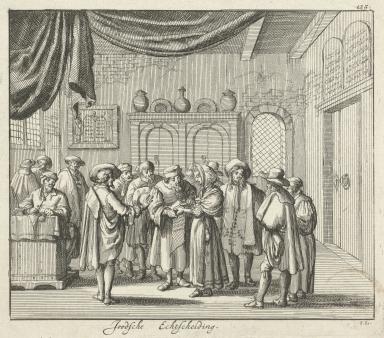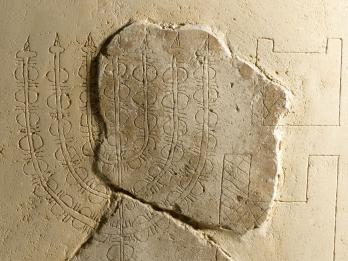Deed of Mediation between Husband and Wife
Jan Luyken
Anonymous
1607
Sensitive Content
With the Almighty’s assistance.
It having been the case that the esteemed and exalted R. Joseph Fico, may his Rock and Redeemer protect him, has been perpetually quarreling with his esteemed wife, Mrs. Esther, may she be blessed above all women, daughter of the wise and exalted R. Solomon Kajiji, may his Rock and Redeemer protect him, now, at last, in our presence, the undersigned witnesses, peace has been mediated between them in the following manner: That the aforesaid R. Joseph has undertaken not to strike again his wife, the aforesaid Mrs. Esther, on any account whatsoever and not to cause her pain, and not to scorn her and not to curse her, and not to refer to her by any name [denoting a curse and not to curse] either her father-in-law, the aforesaid R. Solomon, or his mother-in-law, the wife of the aforesaid R. Solomon, on any account whatsoever. He will behave toward his wife, the aforementioned Mrs. Esther, in all regards, both in public and in private, in a God-fearing manner, as upright married Jewish men behave toward their wives. And if, heaven forbid, he should henceforth transgress any of the specified aforementioned particulars, he hereby grants absolute authority to his wife, the aforesaid Mrs. Esther, to claim the full amount of her contractual marriage settlement from him through the gentile courts—with fully binding legal force. He has, furthermore, undertaken in such circumstances to divorce her with a valid bill of divorce—an absolute divorce—and to release her entirely from the marital bond within twenty-four hours of her demanding the bill of divorce from him, without demur or hindrance, and without any protest, delay or counter claim whatsoever. The aforesaid R. Joseph has hereby accepted the validity of the testimony of a certain female neighbor, who will be residing with them, as equivalent to the evidence given by two fit and proper witnesses for the purpose of obligating him in respect of all the aforesaid matters. And Mrs. Esther has undertaken to behave toward her husband, R. Joseph, in all matters, both in public and in private, in a God-fearing manner, as married Jewish women behave toward their husbands.
And we have effected a full legal acquisition from the hand of R. Joseph and that of his wife, the aforesaid Mrs. Esther, in regard to everything written above concerning them, from this point forward, in accordance with the enactment of our sages of blessed memory. It shall not be considered like a transaction with inconclusive intent, nor like a template of documents. It shall be performed with a maneh [coin] which is halakhically fit for effecting acquisition, without any coercion whatsoever, and invalidating all types of protests, and protests within protests [by either party alleging undue influence exerted upon him/her by the other] and disqualifying the witnesses to the making of such protests absolutely from this point forward, in accordance with the view of Rashba [R. Solomon Ibn Adret] of blessed memory. They have additionally accepted upon themselves a stringent oath by the Name of the Almighty, based on the consent of the Holy One, and the consent of all those swearing truthfully, to implement fully and observe everything written above in relation to them, without raising any objection whatsoever. And this deed has been executed on Thursday, the 16th of Av, in the year 5367 from the Creation, here in Egypt [August 9, 1607]; and we have written out two texts of the deed, one copy for each party. And all is confirmed and clear and in force.
Moses Reuben Joseph Saadia
Scribe and Witness
Credits
Unknown, Deed of Mediation between Husband and Wife, Ms. British Museum, Gaster Collection Or. 10118.10. Republished in Ruth Lamdan, Massekhet, vol. 13 (2007), pp. 151–52.
Published in: The Posen Library of Jewish Culture and Civilization, vol. 5.






